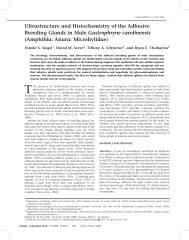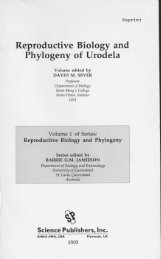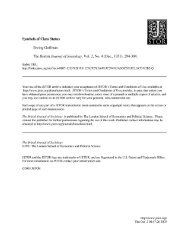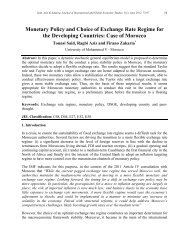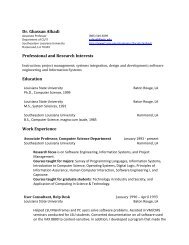Marvelous Facts and Miraculous Evidence in Early Modern Europe ...
Marvelous Facts and Miraculous Evidence in Early Modern Europe ...
Marvelous Facts and Miraculous Evidence in Early Modern Europe ...
You also want an ePaper? Increase the reach of your titles
YUMPU automatically turns print PDFs into web optimized ePapers that Google loves.
122 Lorra<strong>in</strong>e Daston<br />
<strong>Facts</strong> <strong>and</strong> <strong>Evidence</strong><br />
facts of the early modern period.90 However, as for Protestants, doctr<strong>in</strong>e<br />
steered Catholic deliberations over evidence, no matter how solid <strong>and</strong><br />
copious the latter. Hume noted that the heal<strong>in</strong>g miracles performed <strong>in</strong> the<br />
Parisian parish of Sa<strong>in</strong>t-Medard <strong>in</strong> 1731 were immeasurably better confirmed<br />
than those of Christ <strong>and</strong> his disciples,91 but after a meticulous<br />
<strong>in</strong>vestigation the Archbishop V<strong>in</strong>timille condemned the Sa<strong>in</strong>t-Medard<br />
cures for foster<strong>in</strong>g Jansensism <strong>and</strong> "subvert[<strong>in</strong>g] the natural, established<br />
order of the Church."92 De facto if not de jure, the Catholic church also<br />
subscribed to the doctr<strong>in</strong>e of the cessation of miracles, <strong>and</strong> for much the<br />
same reasons that John Calv<strong>in</strong> had, namely, that miracles "could disturb<br />
<strong>and</strong> arouse doubts <strong>in</strong> a m<strong>in</strong>d that would otherwise be tranquil [en repos]."93<br />
The reaffirmation of political <strong>and</strong> religious authority reflected <strong>in</strong> the<br />
official dismissal of unsettl<strong>in</strong>g portents <strong>and</strong> miracles on both sides of the<br />
Channel had its theological analogue <strong>in</strong> the centralization of div<strong>in</strong>e power,<br />
especially <strong>in</strong> Protestant writ<strong>in</strong>gs. Both the natural <strong>and</strong>, particularly, the<br />
preternatural doma<strong>in</strong>s lost territory as a result. Robert Boyle attacked<br />
natural philosophers who granted nature an unseemly amount of autonomy<br />
by endow<strong>in</strong>g it with plastic powers <strong>and</strong> capricious deviations; nature<br />
was simply brute, passive matter set <strong>in</strong> motion <strong>and</strong> susta<strong>in</strong>ed by God.94<br />
Neither mechanistic nor Newtonian natural philosophy necessarily promoted<br />
nature's <strong>in</strong>dependence <strong>and</strong> the <strong>in</strong>violability of natural law. As<br />
Clarke put it <strong>in</strong> his Boyle lectures of 1705, "what Men commonly call the<br />
Course of Nature, or the Power of Nature" is simply the "Will of God" which<br />
"is as easie to be altered at any time, as to be preserved" (D, p. 377).<br />
The preternatural had depended crucially on <strong>in</strong>subord<strong>in</strong>ation to<br />
div<strong>in</strong>e decree, both nature's <strong>and</strong> the devil's, <strong>and</strong> therefore virtually disappeared<br />
as a result of God's new, tightened regime. Although few went so<br />
far as to deny the devil's existence, he was, like nature, put on a very short<br />
leash. Clarke thought God could at least partially restra<strong>in</strong> evil spirits (see<br />
D, p. 391), <strong>and</strong> Fleetwood essentially demoted the devil to God's lieutenant,<br />
"for his Power or Impotence, it depends entirely on God, how far he<br />
will restra<strong>in</strong> or limit him" (EM, p. 50). By grant<strong>in</strong>g God a monopoly on<br />
agency <strong>in</strong> the universe, late seventeenth-century Protestant theologians,<br />
at least English ones, radically simplified ontology as well. Sp<strong>in</strong>oza's pantheistic<br />
critique of miracles was a sc<strong>and</strong>al because it merged God with<br />
nature, but the simplify<strong>in</strong>g ontological tendencies of the Tractatus<br />
theologico-politicus (1670), as well as the contempt for the low underst<strong>and</strong><strong>in</strong>g<br />
of the "masses," were echoed <strong>in</strong> numerous, more orthodox works.<br />
90. Ibid., p. 316.<br />
91. See Hume, "On Miracles."<br />
92. B. Robert Kreiser, Miracles, Convulsions, <strong>and</strong> Ecclesiastical Politics <strong>in</strong> <strong>Early</strong><br />
Eighteenth-Century Paris (Pr<strong>in</strong>ceton, N. J., 1978), p. 370.<br />
93. Calv<strong>in</strong>, "Epistre."<br />
94. Robert Boyle, "A Free Inquiry <strong>in</strong>to the Vulgarly Received Notion of Nature," <strong>in</strong><br />
Works of the Honourable Robert Boyle, ed. Thomas Birch, 5 vols. (1685; London, 1744), 4:398.



